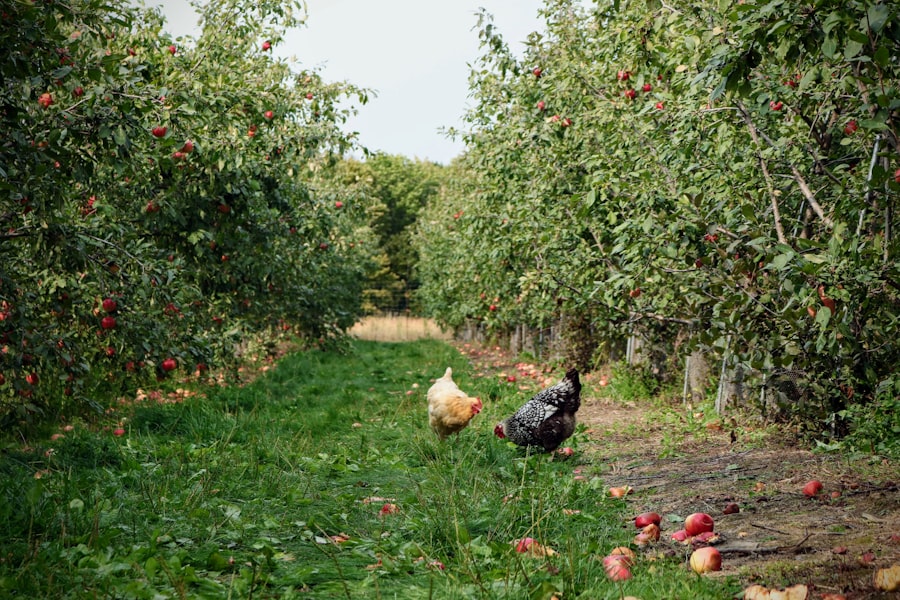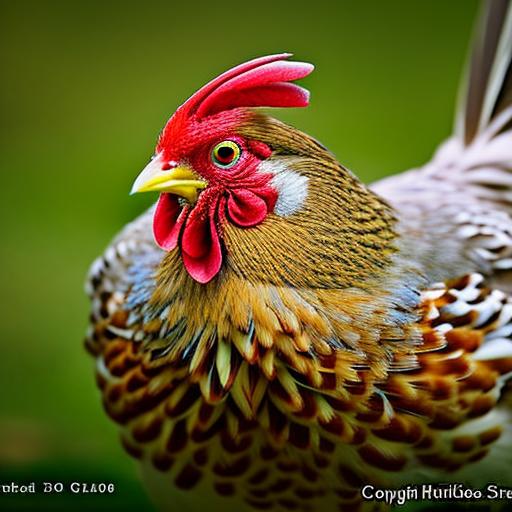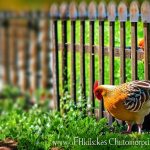Keeping chickens in an orchard is a practice that has gained popularity among farmers and homeowners alike. It involves allowing chickens to roam freely in an orchard, providing them with a natural environment to forage and thrive. This concept not only benefits the chickens but also has numerous advantages for the orchard itself.
The idea behind keeping chickens in an orchard is to create a symbiotic relationship between the two. The chickens help control pests, fertilize the soil, and maintain a healthy ecosystem within the orchard. In return, they have access to a diverse range of food sources, including insects, fallen fruit, and vegetation.
Key Takeaways
- Keeping chickens in an orchard can provide numerous benefits, including pest control, fertilizer production, and egg production.
- Before keeping chickens in an orchard, it is important to consider factors such as local regulations, space requirements, and potential predators.
- When choosing chicken breeds for your orchard, consider factors such as temperament, egg production, and cold hardiness.
- Building a chicken coop in your orchard requires careful planning and consideration of factors such as size, ventilation, and predator protection.
- Maintaining a clean and healthy chicken coop is essential for the health and well-being of your chickens and the success of your orchard.
Benefits of Keeping Chickens in an Orchard
One of the main benefits of having chickens in an orchard is pest control. Chickens are natural predators of insects and can help reduce populations of pests that can damage fruit trees. They eat a variety of insects, including beetles, caterpillars, and grasshoppers, which can be detrimental to the health of the orchard.
Another benefit is fertilization. Chickens produce manure that is rich in nutrients, such as nitrogen, phosphorus, and potassium. When they roam freely in the orchard, their droppings enrich the soil, providing essential nutrients for the fruit trees. This natural fertilization process helps improve soil quality and promotes healthy tree growth.
Chickens also play a role in maintaining a healthy orchard ecosystem. They scratch and dig in the soil, aerating it and breaking up compacted areas. This helps improve water infiltration and root growth. Additionally, their foraging behavior helps control weeds by eating weed seeds and preventing them from germinating.
Factors to Consider Before Keeping Chickens in an Orchard
Before bringing chickens into an orchard, it is important to research local laws and regulations regarding poultry keeping. Some areas may have restrictions on the number of chickens allowed or require permits. It is essential to comply with these regulations to avoid any legal issues.
Proper planning and preparation are also crucial before introducing chickens into an orchard. Consider the size of the orchard and the number of chickens you plan to keep. Ensure that there is enough space for the chickens to roam and forage without causing damage to the fruit trees. It is also important to provide adequate shelter and protection from predators.
Choosing the Right Chicken Breeds for Your Orchard
When choosing chicken breeds for your orchard, consider their characteristics and how they will fit into your specific needs and preferences. There are different types of chicken breeds, including dual-purpose breeds, egg-laying breeds, and meat breeds.
Dual-purpose breeds are a popular choice for orchards as they are good for both egg production and meat. They are generally hardy and adaptable, making them suitable for various climates. Examples of dual-purpose breeds include Rhode Island Reds, Plymouth Rocks, and Sussex.
Egg-laying breeds are known for their high egg production. If your main goal is to have a steady supply of fresh eggs, consider breeds such as Leghorns, Australorps, or Orpingtons. These breeds are prolific layers and can provide you with a consistent supply of eggs throughout the year.
If you are primarily interested in meat production, there are specific meat breeds that grow quickly and have good meat quality. Examples include Cornish Cross, Freedom Rangers, and Jersey Giants. These breeds are bred specifically for meat production and can be a good choice if you plan to raise chickens for meat in your orchard.
Building a Chicken Coop in Your Orchard: What You Need to Know
Having a chicken coop in your orchard is essential for providing shelter, protection, and a safe place for your chickens to roost and lay eggs. When building a chicken coop, there are a few basic requirements to consider.
First, the coop should be well-ventilated to ensure proper air circulation. This helps prevent the buildup of moisture and ammonia, which can lead to respiratory issues for the chickens. Adequate ventilation can be achieved through windows, vents, or openings in the coop.
Lighting is another important factor to consider. Chickens require natural light for their well-being and egg production. Ensure that the coop has windows or openings that allow natural light to enter during the day. You can also provide artificial lighting if needed, especially during the winter months when daylight hours are shorter.
Essential Features of a Chicken Coop for Your Orchard

In addition to ventilation and lighting, there are other essential features that should be included in a chicken coop for your orchard. These features ensure that the coop is safe and comfortable for your chickens.
One important feature is nesting boxes. Chickens need a quiet and private space to lay their eggs. Provide enough nesting boxes for your chickens, ensuring that they are clean and filled with soft bedding material such as straw or wood shavings.
Roosting bars are also essential for chickens to perch on at night. They prefer to sleep off the ground to feel safe from predators. Install roosting bars at a height that allows enough space for all your chickens to comfortably roost.
Another important feature is a secure door or gate to keep predators out. Make sure that the coop is predator-proof by using sturdy materials and installing locks or latches on doors and windows. This will help protect your chickens from predators such as raccoons, foxes, and snakes.
Chicken Coop Plans: Tips for Designing Your Own Coop
If you prefer to design your own chicken coop, there are a few tips to keep in mind. Consider the size of your flock and plan accordingly. The coop should have enough space for all your chickens to move around comfortably and engage in natural behaviors such as scratching and dust bathing.
Ensure that the coop is easy to clean and maintain. Include features such as removable trays or droppings boards for easy cleaning of chicken waste. This will help keep the coop clean and prevent the buildup of bacteria and odors.
Consider the climate in your area when designing the coop. If you live in a cold climate, insulate the coop and provide a heat source during the winter months. If you live in a hot climate, ensure that the coop has adequate ventilation and shade to keep the chickens cool.
Maintaining a Clean and Healthy Chicken Coop in Your Orchard
Maintaining a clean and healthy chicken coop is essential for the well-being of your chickens and the overall health of your orchard. Regular cleaning helps prevent the spread of diseases and parasites, as well as keeps the coop smelling fresh.
Start by removing any wet or soiled bedding material from the coop on a regular basis. Replace it with fresh bedding to provide a clean and comfortable environment for your chickens. This will also help absorb moisture and control odors.
Regularly check for signs of pests such as mites or lice. These parasites can cause discomfort and health issues for your chickens. Treat any infestations promptly using appropriate methods or consult a veterinarian for guidance.
Provide clean water and feed for your chickens on a daily basis. Ensure that water containers are cleaned regularly to prevent the growth of bacteria. Feed should be stored in a dry and secure location to prevent spoilage and contamination.
Protecting Your Orchard from Chicken Predators
While chickens can help control pests in an orchard, they can also attract predators. It is important to take measures to protect your orchard from chicken predators to ensure the safety of your flock.
Identify common predators in your area, such as raccoons, foxes, or hawks, and take appropriate measures to deter them. Install fencing around the orchard to keep out larger predators. Use wire mesh with small openings to prevent smaller predators from entering.
Consider using motion-activated lights or noise devices to scare away predators. These can be effective in deterring nocturnal predators such as raccoons or opossums. Additionally, provide secure shelter for your chickens at night to protect them from predators that may be more active during the dark.
The Joys of Keeping Chickens in Your Orchard
Keeping chickens in an orchard can be a rewarding and enjoyable experience. Not only do they provide numerous benefits for the orchard, but they also offer the satisfaction of producing your own eggs and meat.
The natural pest control and fertilization provided by chickens can help maintain a healthy orchard ecosystem. Their presence adds life and vibrancy to the orchard, creating a harmonious environment where both chickens and fruit trees thrive.
By researching local laws and regulations, planning and preparing properly, choosing the right chicken breeds, building a suitable chicken coop, maintaining cleanliness and health, and protecting against predators, you can successfully keep chickens in your orchard and enjoy the many joys they bring.
If you’re considering keeping chickens in your orchard, you may also be interested in learning about suitable housing options for your feathered friends. Check out this informative article on the Poultry Wizard website that discusses the importance of providing a coop for turkeys. Discover why turkeys need a coop and how it can benefit their health and well-being. To find out more, click here: https://poultrywizard.com/keeping-turkey/do-turkeys-need-a-coop/. Additionally, if you’re looking for practical coop solutions for your chickens, the Poultry Wizard website offers insights into snap-lock chicken coops and A-frame chicken coops. Explore these options to find the perfect housing solution for your flock. To learn more about snap-lock chicken coops, click here: https://poultrywizard.com/keeping-chickens/snaplock-chicken-coop/. And to discover the benefits of an A-frame chicken coop, click here: https://poultrywizard.com/keeping-chickens/a-frame-chicken-coop/.
FAQs
What is an orchard?
An orchard is a piece of land where fruit trees are grown for commercial or personal use.
Can chickens be kept in an orchard?
Yes, chickens can be kept in an orchard as long as certain precautions are taken to protect the trees and the chickens.
What precautions should be taken when keeping chickens in an orchard?
The chickens should be kept in a designated area within the orchard, away from the trees. The area should be fenced to prevent the chickens from wandering into the orchard and damaging the trees. The chickens should also be provided with a shelter to protect them from predators.
What are the benefits of keeping chickens in an orchard?
Chickens can help control pests in the orchard, such as insects and rodents. They can also provide fertilizer for the trees through their droppings. Additionally, chickens can provide eggs and meat for personal use or sale.
What are the potential drawbacks of keeping chickens in an orchard?
Chickens can damage the trees by scratching at the roots or pecking at the fruit. They can also attract predators, such as foxes or raccoons, which can harm both the chickens and the trees. Additionally, chickens can create noise and odor, which may be a nuisance to neighbors.
Are there any legal restrictions on keeping chickens in an orchard?
There may be local ordinances or zoning laws that regulate the keeping of chickens. It is important to check with the local authorities before keeping chickens in an orchard.
Meet Walter, the feathered-friend fanatic of Florida! Nestled in the sunshine state, Walter struts through life with his feathered companions, clucking his way to happiness. With a coop that’s fancier than a five-star hotel, he’s the Don Juan of the chicken world. When he’s not teaching his hens to do the cha-cha, you’ll find him in a heated debate with his prized rooster, Sir Clucks-a-Lot. Walter’s poultry passion is no yolk; he’s the sunny-side-up guy you never knew you needed in your flock of friends!







